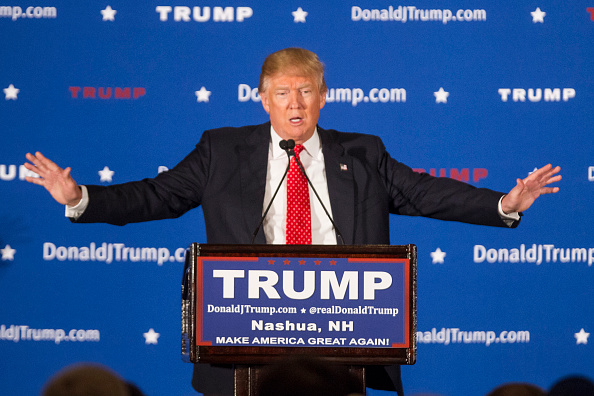
Donald Trump doesn’t care about veterans or the military. He might not even understand the difference between them.
Thursday night’s rally, which the Republican presidential candidate timed to coincide with the Republican debate, reminded us of just one fact: Donald Trump cares about winning. Veterans are a convenient means to help him, nothing more.
The event was designed for the sole purpose of reinforcing Trump’s frontrunner status. The majority of his remarks were focused on how far ahead he is in the polls, or congratulating his wealthy friends for their outsized donations.
Trump barely mentioned veterans. What he wanted was the best possible excuse to avoid the debate. Veterans, especially wounded veterans, were the perfect excuse. Who doesn’t want to support veterans? That was the key to claiming the moral high ground. Without fundraising for such a popular cause, Trump would have been just another candidate whining about unfair treatment by moderators.
But despite his best efforts, Trump can’t fake a history of caring about veterans. Last year we learned how little his foundation has actually contributed to veteran causes—only $57,000 of $5.5 million in donations between 2009 and 2013.
Despite a lack of any demonstrated interest or connection to veterans, Trump relished the chance to draw comparisons between his checkered career in business and the battlefield exploits of others. He said he “has a different sort of guts” and is “financially courageous,” two phrases that must have prompted winces among some veterans watching the event—myself included.
The real show began after the parade of politicians and millionaire friends, when Trump introduced John Wayne Walding, a former Green Beret sniper. Trump needed someone else to talk about veteran issues because he is unable to speak for more than five seconds about the topic without repeating himself. The former sniper, fittingly born on the Fourth of July, is the stereotypical cowboy. He had no qualms about describing himself as a “barrel-chested freedom fighter,” which set the intellectual tone for a rambling speech that could have been lifted from a scene in Team America: World Police.
The ensuing tirade about military suicides, while compelling, was yet the latest example of Trump’s approach. It was exactly the kind of flag-waving, fact-free performance that characterizes everything about his business dealings and presidential campaign.
John Wayne cited the now commonly referenced figure of 22 veteran suicides per day as the key indicator that veterans, somewhere, somehow, need our help. There was no nuance in the argument, nor any actual proposals to improve the conditions that lead to suicide among the veteran population.
The problem is how frequently the number is used out of context to drive political or fundraising agendas. Like much of what Trump says, the figure has been widely disputed. The source of the number, the 2012 VA report, acknowledges the lack of comprehensive data, which did include the three most populous states.
The data indicate that veteran suicide is driven by demographics. Suicides are especially prevalent among older men. Most veterans are older men. In fact, at least 69% of veteran suicides reported in the VA’s own data were over the age of 50. This runs completely counter to the narrative from Trump’s rally, which created the impression that young men coming home from Iraq and Afghanistan were the primary at-risk group.
Of course, raising money for valuable charities is a good thing, and the Trump campaign claims to have raised more than $6 million last night—$1 million personally from the candidate. Yet at least one veterans groups has said it doesn’t want his money.
Veterans are not an issue for Trump. Winning is an issue, the only issue. And it’s infuriating to see him hide behind the veteran community, peeking out only to claim victory.
More Must-Reads from TIME
- Why Biden Dropped Out
- Ukraine’s Plan to Survive Trump
- The Rise of a New Kind of Parenting Guru
- The Chaos and Commotion of the RNC in Photos
- Why We All Have a Stake in Twisters’ Success
- 8 Eating Habits That Actually Improve Your Sleep
- Welcome to the Noah Lyles Olympics
- Get Our Paris Olympics Newsletter in Your Inbox
Contact us at letters@time.com